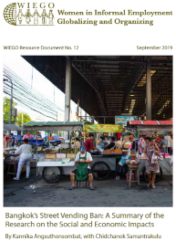Bangkok’s Street Vending Ban: A Summary of the Research on the Social and Economic Impacts
Bangkok was long viewed as a global model for effective, socially progressive management of street vending (see Nirathron and Yasmeen 2014). This took a dramatic shift in 2014 when, following the country’s military coup, the Bangkok Metropolitan Authority (BMA) launched the “Return the Footpath to Pedestrians” policy. Although the city had previously “cracked down” on vending (Nirathron and Yasmeen 2014, Tangworamongkhon 2014), the waves of evictions during this period are the most extreme and far-reaching that the city has ever experienced. Tens of thousands of vendors have been affected, and, as a result in 2017, current and former vendors affected by the ban joined together to form the Network of Thai Vendors for Sustainable Development. The Network represents vendors — including those who sell food, clothing, dry goods, and souvenirs — from 25 districts and 34 vending areas in Bangkok.
This study reviews data from members of the Network following the cancellation of permitted street vending zones between 2016 and 2017 in Bangkok. It examines the general characteristics of street vendors; the impact of the ban on vendors, families, related businesses, and urban safety; adaptations by vendors; and policy recommendations.
View list of all: Resource Documents

